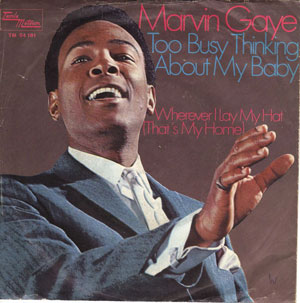
"Too Busy Thinking About My Baby" is a Motown song written by Norman Whitfield, Barrett Strong, and Janie Bradford. The song was first recorded by The Temptations as a track on their 1966 album Gettin' Ready. Eddie Kendricks sings lead on the recording, which was produced by Whitfield. Jimmy Ruffin also recorded a version with The Temptations providing background vocals in 1966. It remained unreleased until 1997.
"That's the Way Love Is" is a 1967 Tamla (Motown) single recorded by The Isley Brothers and produced by Norman Whitfield.
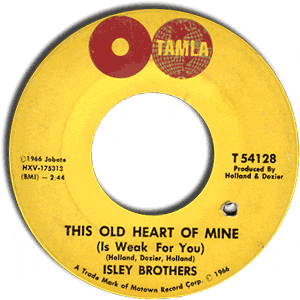
"This Old Heart of Mine (Is Weak for You)" is a Holland–Dozier–Holland song that was a hit for American musical group the Isley Brothers in January 1966 during their brief tenure on Motown's Tamla label. Featuring Ronald Isley on lead vocal, "This Old Heart of Mine" peaked at number twelve on the Billboard Hot 100, and at number six on the Billboard R&B Singles chart.
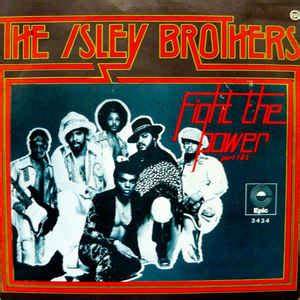
"Fight the Power" is a song recorded by the Isley Brothers, who released the song as the first single off their landmark album, The Heat Is On. The song is notable for the usage of the word bullshit, which was censored during radio airplay.
"Live It Up, Pt. 1 & 2" is a funk/rock song released by the Isley Brothers, on their album of the same name in 1974 on their T-Neck imprint.
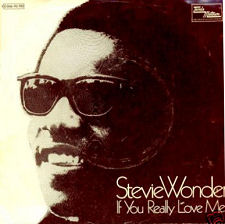
"If You Really Love Me" is a song written by Stevie Wonder and Syreeta Wright. Wonder recorded the song and released his version as a single from his 1971 album Where I'm Coming From. The single peaked in the top 10 of the Billboard Hot 100, Billboard′s R&B chart, and Billboard′s Easy Listening chart.
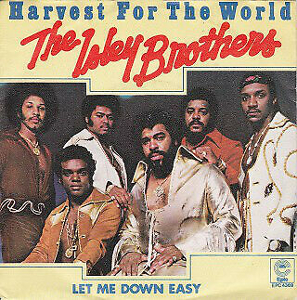
"Harvest for the World" is a 1976 single released by American musical group The Isley Brothers on their T-Neck imprint. It was the title track from their 1976 album Harvest for the World.
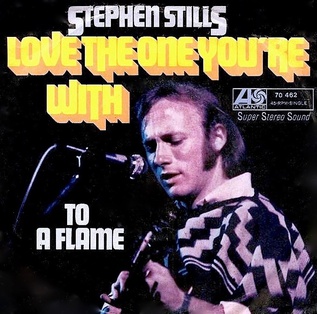
"Love the One You're With" is a song by American folk rock musician Stephen Stills. It was released as the lead single from his debut self-titled studio album in November 1970. The song, inspired by a remark Stills heard from musician Billy Preston, became his biggest hit single, peaking at No. 14 on the Billboard Hot 100 in early 1971. David Crosby and Graham Nash, Stills's fellow members of Crosby, Stills & Nash, provide background vocals on the song. Also providing the backups are Rita Coolidge, her sister Priscilla Jones, and John Sebastian. They all sing the "Do Dos" that come before the instrumental portion and the outro. The song was also recorded by the Isley Brothers, The Meters, Bucks Fizz, Luther Vandross, Bob Seger and Richard Clapton, among others.

"Summer Breeze" is a 1972 song by American soft rock duo Seals and Crofts. It is the title track of their fourth studio album, and was released as the album's lead single in August 1972. The song reached No. 6 on the US Billboard Hot 100 chart in the US. In 2013, it was ranked No. 13 in Rolling Stone′s "Best Summer Songs of All Time". The song also became a hit for the Isley Brothers in 1974.

"Work to Do" is a 1972 funk song by the Isley Brothers, released on their T-Neck imprint. The song, written and produced by the group, was issued on their 1972 album, Brother, Brother, Brother, and charted at #51 pop and #11 R&B upon its initial charting.
"Freedom" is a 1970 R&B / funk song released by the Isley Brothers on their T-Neck imprint. The song was written and produced by O'Kelly Isley, Ronald Isley, and Rudolph Isley.
"Don't Say Goodnight (It's Time for Love)" is a 1980 soul and quiet storm record by the Isley Brothers, released on their T-Neck imprint. The track was released as the first single from their 1980 platinum album, Go All the Way.
"The Pride" is a 1977 funk song by The Isley Brothers, released on their T-Neck imprint. The song, which was the first single released from their album, Go For Your Guns, was written as a warning to politicians to be the leader that the people need and to others who want change reminding them that "the pride makes (them) feel that (they) belong". The song was one of several socially conscious political songs the Isleys recorded throughout the 1970s including "Fight the Power Pts. 1 & 2" and "Harvest for the World". While the song peaked at sixty-three on the pop charts, it reached number-one on the R&B singles chart becoming the group's third number one on the chart.

"Take Me in Your Arms (Rock Me a Little While)" is a song written by the premier Motown songwriting/production team of the 1960s Holland–Dozier–Holland. The first hit recording was sung by Kim Weston in 1965. It was most popular in 1975 when it was recorded by the Doobie Brothers.
"I Guess I'll Always Love You" is a 1966 single by The Isley Brothers, released on Motown's Tamla label, and is a Holland–Dozier–Holland composition. In the US, the single made both the Hot 100, and R&B singles chart.
"Take Me to the Next Phase " was a hit song for R&B/funk band The Isley Brothers. The song has the sound of a live stadium recording, but it was created entirely in a recording studio. Ernie and Marvin Isley plus Chris Jasper laid the foot stomps and some of the crowd noises across 24 recording tracks. Released from their platinum selling 1978 album, Showdown, the single spent 2 weeks at number one on the R&B singles chart. However, it never managed to cross over to the Billboard Hot 100 singles chart.
"Put Yourself in My Place" is a song written by the Motown team of Holland–Dozier–Holland and recorded by at least four Motown recording acts during the sixties: The Elgins in 1965, The Supremes, Chris Clark and The Isley Brothers in 1966.

"It's a Disco Night " is a 1979 club hit for The Isley Brothers, released on their T-Neck label as the second single from their gold-certified album Winner Takes All. The song is notable for being one of the few disco-based songs the Isley Brothers released. Beforehand, the group were known for their mixture of funk, rhythm and blues and rock. The song was led by brother Ronald Isley while his brothers Kelly and Rudolph Isley chanted "rock don't stop" in the background. The song briefly charted on the Billboard Hot 100 peaking at number 90, hitting number 27 on the R&B chart. Outside the US, "It's a Disco Night" reached number 14 on the UK Singles chart.
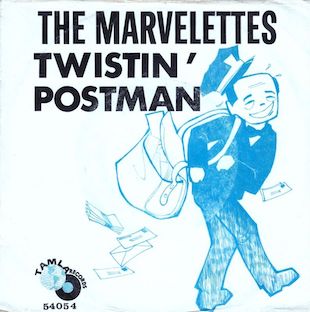
"Twistin' Postman" is a song recorded by Motown singing group The Marvelettes, who released it in 1961, and was the follow-up to their smash debut single, "Please Mr. Postman".
"Greetings (This Is Uncle Sam)" is a 1961 song recorded by three American R&B music groups, The Valadiers, The Monitors, and The Isley Brothers for the Motown label. It was written by Robert Bateman, Brian Holland, Stuart Avig, Martin Coleman, Art Glasser, Jerry Light, P Bennet, Lawrence Horn and Ronald Dunbar. (Avig, Coleman, Glasser and Light were members of the Valadiers.) The Isley Brothers version was shelved while the Valadiers' and Monitors' versions give both groups their first and only charter on the Billboard Hot 100 charts and became the biggest "hit" for each; both groups could only archive very minor hits due to non-promotion.










